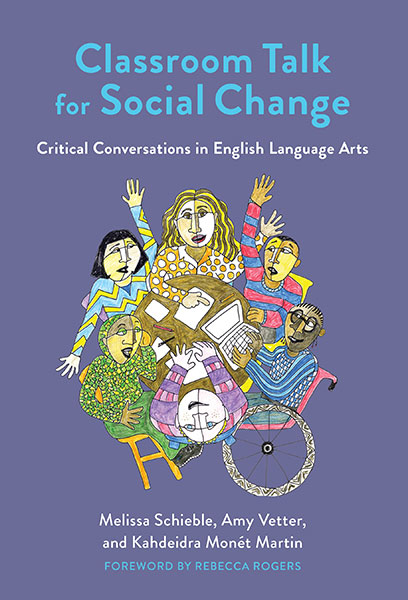Professors: Request an Exam Copy
Print copies available for US orders only. For orders outside the US, see our international distributors.
Melissa Schieble, Amy Vetter, Kahdeidra Monét Martin
Foreword by: Rebecca Rogers
Publication Date: February 14, 2020
Pages: 160

Learn how to foster critical conversations in English language arts classrooms. This guide encourages teachers to engage students in noticing and discussing harmful discourses about race, gender, and other identities. The authors take readers through a framework that includes knowledge about power, a critical learner stance, critical pedagogies, critical talk moves, and vulnerability. The text features in-depth classroom examples from six secondary English language arts classrooms. Each chapter offers specific ways in which teachers can begin and sustain critical conversations with their students, including the creation of teacher inquiry groups that use transcript analysis as a learning tool.
Book Features:
Melissa Schieble is an associate professor of English education at Hunter College of the City University of New York. Amy Vetter is a professor in English education in the School of Education at the University of North Carolina Greensboro. Kahdeidra Monét Martin is a presidential research fellow and doctoral candidate in Urban Education at the Graduate Center of the City University of New York.
“Expertly organized and presented, Classroom Talk for Social Change: Critical Conversations in English Language Arts is an extraordinary and unreservedly recommended addition to school district, college, and university library Teacher Education collections and supplemental curriculum studies lists.”
—Midwest Book Review
“To build classrooms that hold the potential for humanizing, problematizing, and resisting power and oppression, how we interact and relate is central. Overall, this book offers a lot for teachers of various positions and experiences.”
—Teachers College Record
“ Classroom Talk for Social Change encourages teachers to engage students in noticing and discussing harmful discourses about race, gender, and other identities. The authors take readers through a framework that includes knowledge about power, a critical learner stance, critical pedagogies, critical talk moves, and vulnerability. The text feature in-depth classroom examples from six secondary English language arts classrooms. Each chapter offers specific ways in which teachers can begin and sustain critical conversations with their students, including the creation of teacher inquiry groups that use transcript analysis as a learning tool.”
—Sir Read A Lot
“This carefully researched volume is an invaluable go-to guide for teachers eager to address critical conversations responsibly.”
—English Education
“This text lays out the why and how of engaging students in these critical conversations, which would be of value to nearly any discussion-based course in any field. The authors also showcase the power of inquiry groups as a tool to study one’s own practice and reflect with others in a collaborative setting.”
—The Wabash Center Journal on Teaching
“Classroom Talk for Social Change impressively builds on a lineage of scholarship committed to classroom inquiry through talk in a way that helps fellow educators to visualize why and how classroom talk matters. The authors position critical conversations at the nexus of critical literacy, dialogic teaching, and culturally sustaining teaching.”
—From the Foreword by Rebecca Rogers, Curators’ Distinguished Research Professor, University of Missouri-St. Louis
“Drawing on rich theoretical and empirical scholarship, the authors make a compelling case for the central role of critical conversations in today’s diverse classrooms. This book provides teachers with a framework for embracing difficult questions about power and privilege, illustrating how engaging students in such questions provides vital preparation for participation in democracy.”
—Amanda Haertling Thein, associate dean for Academic Affairs and Graduate Programs and
professor of language, literacy, and culture at the College of Education, University of Iowa
Contents
Foreword Rebecca Rogers ix
Acknowledgments xi
1. Introduction 1
Why Do We Need to Have Critical Conversations in Schools? 1
Book Overview 3
2. What Do Critical Conversations Look Like in Schools? 11
How are Critical Conversations Generative in ELA Classrooms? 13
Theories that Support Critical Conversations 16
Tensions of Critical Conversations 19
3. Building Knowledge About Power and Privilege: Confronting Dominant Narratives 23
Are All Perspectives Equally Valid? 27
Dominant Narratives of Gender and Sexuality 28
The Dominant Narrative of Individualism 30
Critical Conversations in Action: Intersections of Gender and Individualism 31
4. Engaging a Critical Learner Stance Through Racial Literacy 36
Practicing Critical Self-Reflection 36
What Is Critical Consciousness? 38
Engaging a Critical Learner Stance Through Racial Literacy 41
Strategies for Practicing a Critical Learner Stance 47
Try It Out: Engaging a Critical Learner Stance to Change Teaching Practice 52
5. Preparing Students for Critical Conversations: Creating a Critical Space 54
“Reading” Classroom Spaces with a Critical Lens 54
Establishing a Classroom Culture for Critical Conversations 56
Negotiating Tension and Modeling Repair 66
6. Making Meaning During Critical Conversations 73
Humanizing 74
Problematizing 78
Resistance During Critical Conversations 81
7. Sustaining Critical Conversations Through Critical Talk Moves 90
Critical Talk Moves 92
Critical Conversations: Carson’s Critical Talk Moves 98
Building Interactional Awareness about Critical Talk Moves 104
8. Studying Critical Conversations in Teacher Inquiry Groups Using Transcripts 106
What are Inquiry Groups? 106
What Did Teachers Say They Learned in the Inquiry Groups? 110
What Did Teachers Say They Learned from Analyzing Classroom Talk? 111
Final Thoughts 122
References 125
Index 135
About the Authors 145
2021 Initiative for 21st Century Literacies Research Divergent Book Award for Excellence
Professors: Request an Exam Copy
Print copies available for US orders only. For orders outside the US, see our international distributors.